Plastic Waste Suppliers
Air Date: Week of June 25, 2021
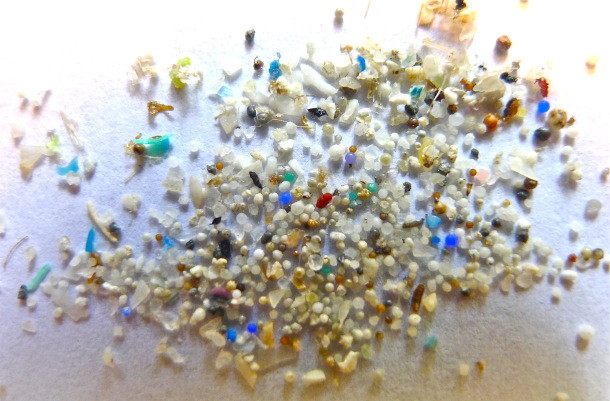
As tons of plastic litter our oceans, microplastics pose a growing problem for our ecosystems and our health. Not only are microplastics found in the world’s oceans, but they have been found in our food like salt and beer, and also in our bodies, according to an Italian study titled “Plasticenta.” (Photo: 5Gyres, Oregon State University, Flickr, CC BY 2.0)
The world is literally awash in plastic waste, with 8 million metric tons of plastic flowing into our oceans every year. Much of that waste is take-away packaging, and a recent study found that only 20 companies are responsible for most of this waste. Host Bobby Bascomb talks with Judith Enck, founder of Beyond Plastics, about why fossil fuel companies are moving towards more plastic production, as well as what alternatives and next steps we can take to avoid using single-use plastics.
Transcript
BASCOMB: The world is literally awash in plastic waste. More than 8 million metric tons of plastic flow into our oceans every year. And the vast majority of that waste near shore, roughly 88 percent, is take away packaging, things like bottles, food containers, plastic bags and cutlery. A recent study published by the Australian based Minderoo Foundation found that at its root, just 20 companies produce more than half of the world’s single use plastic waste. For more, I’m joined now by Judith Enck founder of Beyond Plastics and visiting Professor at Bennington College. Welcome back to Living on Earth Judith!
ENCK: Oh, it's such a pleasure to be with you. Thanks. I love Living on Earth.
BASCOMB: Oh, thank you. Can you give us a bit of background on this study? What were they looking for? And what did they find?
ENCK: Well, this study is important, because for the first time it was looking at what are the companies that produce the most plastic feedstock. These are called polymers, they are the building blocks of all plastics. And the study documented that these plastic polymers are almost always made from fossil fuels. And this study found that in 2019, 20 companies made more than half of all single-use plastic waste generated worldwide. And top of the list are ExxonMobil and Dow, followed by Chinese government-owned Sinopec. So of about 300 polymer producers operating worldwide, it's only a small number of companies that are producing all of these plastics. The study went a little deeper, and looked at who are the investors and the banks that are enabling this massive production of single-use plastic, and the study identified 20 institutional asset managers that are backing these businesses: Vanguard group, BlackRock and Capital Group. So it's kind of interesting, the climate change advocates shifted from the emitters of greenhouse gases maybe ten, 15 years ago and started looking at who's financing -- who is enabling all of this dirty technology. And for the first time, this report did the same thing with plastic production.
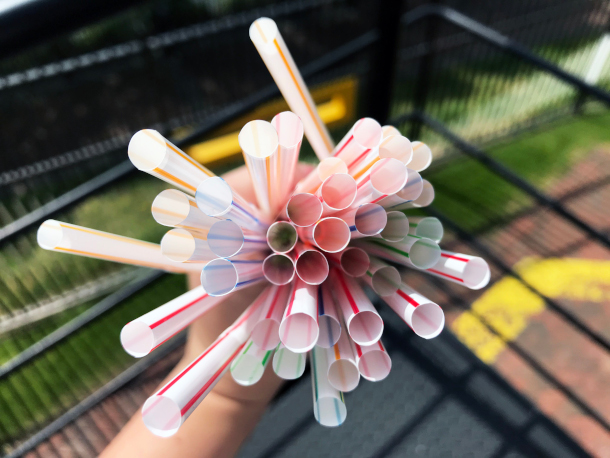
Plastic straws are amongst the top ten marine debris in the ocean and in the United States alone about 500 million plastic straws are produced each year. (Photo: Chemist 4 U, Flickr, CC BY 2.0)
BASCOMB: Well, that's really interesting. And you know, I think a lot of our listeners might be surprised to hear that the top companies aren't necessarily beverage companies or manufacturers of single-use plastic bags, for instance. But they're actually oil and gas companies.
ENCK: Oh, yes, plastic production is the plan B for the fossil fuel industry. What's happening is finally, finally we are moving away from using fossil fuels for the two major markets they've had historically. One is electricity generation -- we're now seeing more investment in renewable energy, like solar and wind, or geothermal. And then the second big demand for fossil fuel is transportation. And we're finally seeing much needed investment in mass transit, electric cars. And the fossil fuel industry is seeing their market reduced for electricity generation and transportation. So their plan B is plastic production. So they have teamed up with the chemical industry, thus the phrase petrochemical industries, and they are using massive amounts of fracked gas and chemicals to create new single use plastics. 98% of single use plastic is manufactured from fossil fuels.
BASCOMB: Well, of course, Exxon recently had three seats on their board of directors claimed by activist investors who are worried that the company, you know, wasn't moving away from fossil fuels quickly enough, given the way the market is changing. It sounds like you're saying that this is you know, they're seeing the writing on the wall here and they're shifting gears towards producing plastic instead.
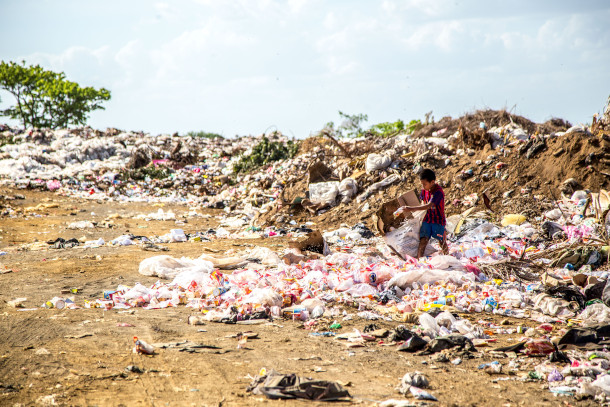
More than 350 million metric tons of plastic are produced each year and 91% of that is not recycled. In 2021 the Break Free from Plastic Pollution Act was introduced in Congress and aims to hold companies responsible for waste and recycling of a variety of products including plastics. (Photo: Recodoil, Flickr, CC BY 2.0)
ENCK: Yeah, and it's really tragic because they're producing plastic in low income communities of color. Exxon and other companies are investing in what's called ethane cracker plants where they take a waste product from fracking, heated at high temperature, thus the phrase cracking the gas, and then that's the main ingredient for single use plastic packaging. These are highly polluting facilities, they release air toxins, they release greenhouse gases, and they are always sighted in low income communities and communities of color. And these are not only risky for the community, people living near these petrochemical facilities, but also these are super emitters of greenhouse gases. And so we'd be cancelling out a lot of the progress we've been made. In fact, if plastic production and use grows us is currently projected, by 2030, the emissions from these petrochemical facilities will be the equivalent of what would be released from 295 new cars coal fired power plants.
BASCOMB: Wow. Well, you know, climate change, of course, is literally an existential threat to life as we know it. And there's a lot of scientists and a lot of policymakers working on this issue with activists pushing them on it. Can you talk about the scale of the plastic problem as compared to climate change? I mean, I know that they're very different, but related, and it seems almost, you know, the issue of plastic waste filling up rivers and ocean and microplastics being consumed by aquatic animals and things, it almost seems like a co equal problem to climate change, in terms of damage to the environment.
ENCK: Yes, absolutely. I mean, the reason I work full time on plastic pollution is because it's a climate change issue. And it's also a water quality issue and an environmental justice issue and a health threat. So in my mind, what's the worst thing you could do with fracked gas? I mean, I don't like fracked gas. But if you're using it to keep homes warm in the winter, you know, there's a public benefit to that. But using fracked gas to make more single use plastic packaging is really, really troubling. We're turning our oceans into landfills. About 15 million metric tons of plastic enter the ocean every year. 80% of that starts as litter. So why keep making cheap plastic packaging? The analogy I use is, let's say you walk into your bathroom at home, the bathtub is overflowing with water. Well, what you would do is try to turn off the tap as opposed to grabbing a mop or some towels. We need to turn off the tap on plastic production because when a plastic water bottle, for instance, or a plastic bag is littered, it gets into storm drains and then gets into a river gets out into the ocean where it becomes microplastics. Microplastics are everywhere. Microplastics are in our drinking water. It's been found in beer, in sea salt, in honey. And also in our own bodies. There's a new Italian study that came out in January that documented for the first time the presence of microplastics in the human placenta, both on the maternal side and the fetal side. And that's because we are all breathing in or consuming, through our mouths, about one credit card size the amount of plastic every single week. And we're going to have more of this is long as the fossil fuel industry continues this massive investment shift toward plastic production.
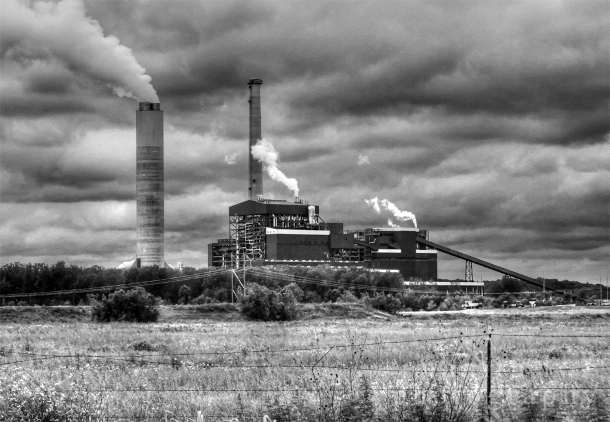
As more steps and investments are taken towards renewable energy and electric vehicles, fossil fuel companies are having to look at a different market: polymer production. Of the companies mentioned in the “Plastic Waste Makers Index,” most are fossil fuel companies, with 98% of single-use plastics manufactured by said companies. (Photo: Tanith K, Flickr, CC BY 2.0)
BASCOMB: Well, how do we turn off the tap, so to speak that you mentioned earlier? I mean, I don't need to tell you, if you walk through a grocery store, everything is wrapped in plastic, sold in a plastic bottle. I mean, it's hard to avoid. And here you have these multibillion dollar companies that are making a profit now from plastic. It's you know, there's a market for it. There's a demand for it, these people are making a lot of money from it. How do you stop that?
ENCK: Well, it's not easy. And certainly we can't recycle our way out of the problem. Plastics has a measly 8.5% recycling rate. So I think what we do is we move beyond plastics, there are viable, affordable alternatives. Things that we've used for decades, like cardboard and paper preferably made from recycled material. Another alternative is metal, glass. But the real important move is to shift away from single use products and shift toward reusable or refillable products. But I think what's clear is we need new laws, that industry is not going to change on their own. One reason is because single use plastics is really cheap. And one reason it's cheap is because it's made from fossil fuel that is heavily subsidized by federal and some state governments. So we need new laws like the Break Free from Plastic Pollution Act that does things like the national bottle bill. It bans single-use polystyrene food packaging, it bans plastic bags, it puts a fee on paper bags. You know the other problem and why I say we need new laws on the books, is because right now the producers, they produce all of this plastic packaging, and they have no financial responsibility to make sure that it's quote "disposed of properly," and they have no responsibility financially to make sure that their packaging is either reused or recycled. So they shift that economic responsibility to tax payers and consumers. And that's why the plastics crisis is just getting worse every year.
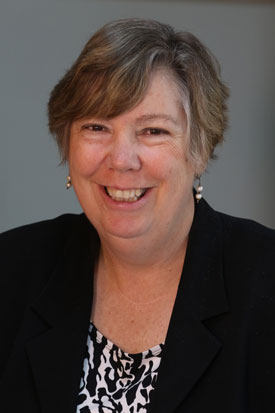
Judith Enck is founder of Beyond Plastics visiting Professor at Bennington College in Vermont and former Regional Administrator for Region 2 of the EPA. (Photo Courtesy of Judith Enck)
BASCOMB: Judith Enck is founder of Beyond Plastics and visiting professor at Bennington College. Judith, thank you so much for taking this time with me today.
ENCK: My pleasure. Thank you
BASCOMB: We reached out to each of the companies that Judith Enck mentioned earlier for a response. In an email, the investment management company Vanguard Group said of the companies they invest in “we do not dictate company strategy, or operational or financial decisions; rather, we hold company board’s responsible for being aware of such risks and opportunities.” The only other company to respond in time for broadcast was Exxon Mobil which said in part, “Industry, governments, nongovernmental organizations and consumers must work collaboratively to encourage appropriate recycling, reuse and recovery of plastic waste. You can read a full statement from each company on the Living on Earth website, LOE.org.
Links
Learn more about the “Plastic Waste Makers Index” here
Italian study on “Plasticenta: First evidence of microplastics in human placenta”
Reuters | "US Lawmakers Target Plastic Pollution, Producers in New Legislation"
Living on Earth wants to hear from you!
Living on Earth
62 Calef Highway, Suite 212
Lee, NH 03861
Telephone: 617-287-4121
E-mail: comments@loe.org
Newsletter [Click here]
Donate to Living on Earth!
Living on Earth is an independent media program and relies entirely on contributions from listeners and institutions supporting public service. Please donate now to preserve an independent environmental voice.
NewsletterLiving on Earth offers a weekly delivery of the show's rundown to your mailbox. Sign up for our newsletter today!
 Sailors For The Sea: Be the change you want to sea.
Sailors For The Sea: Be the change you want to sea.
 The Grantham Foundation for the Protection of the Environment: Committed to protecting and improving the health of the global environment.
The Grantham Foundation for the Protection of the Environment: Committed to protecting and improving the health of the global environment.
 Contribute to Living on Earth and receive, as our gift to you, an archival print of one of Mark Seth Lender's extraordinary wildlife photographs. Follow the link to see Mark's current collection of photographs.
Contribute to Living on Earth and receive, as our gift to you, an archival print of one of Mark Seth Lender's extraordinary wildlife photographs. Follow the link to see Mark's current collection of photographs.
 Buy a signed copy of Mark Seth Lender's book Smeagull the Seagull & support Living on Earth
Buy a signed copy of Mark Seth Lender's book Smeagull the Seagull & support Living on Earth

